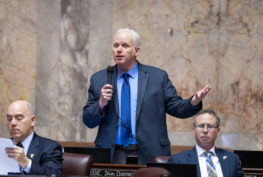A Senate bill passed late Tuesday by the House will prohibit the sale of firefighting foam that contains chemicals deadly to people and destructive to the environment past July of 2020.
“This will limit contamination and exposure to these persistent chemicals, which build up in the environment and in our bodies,” said Sen. Kevin Van De Wege, D-Sequim. “This is good news for pregnant women and young children, as these chemicals can disrupt the endocrine system and impede fetal development.”
The chemicals, known as perfluoroalkyl and polyfluoroalkyl (PFAS), are commonly used to help fight fires at airfields and other places — including during frequent firefighter training drills — where petroleum-based fires pose a risk. PFAS have been found in wells used for drinking water on Whidbey Island, Issaquah, Joint Base Lewis-McChord, and Airway Heights near Fairchild Air Force Base. The chemicals also exist in equipment used by firefighters.
Studies in animals show that exposure to PFAS can affect liver function, reproductive hormones, development of offspring, and mortality. However, PFAS toxicity in humans is less understood, and exposure may be linked to high cholesterol, ulcerative colitis, thyroid disease, testicular cancer, kidney cancer, and pregnancy-induced hypertension.
Van De Wege’s Senate Bill 6413 will:
- Prohibit the sale, manufacture, and distribution of firefighting foam that has perfluoroalkyl and polyfluoroalkyl chemicals (PFAS) intentionally added.
- Require sellers of firefighting personal protective equipment (PPE) containing PFAS to notify purchasers of the equipment; and
- Punish violations of the act with civil penalties up to $5,000 for a first offense and up to $10,000 for subsequent violations.
“The number-one cause of death of firefighters is cancer,” Van De Wege said. “By phasing out this foam, we can protect groundwater and the health of firefighters who regularly use this foam to suppress fires.”
Since the bill passed the Senate and was then amended in the House, the differences between the two versions must be reconciled before the bill can be sent to the governor to be signed into law.




